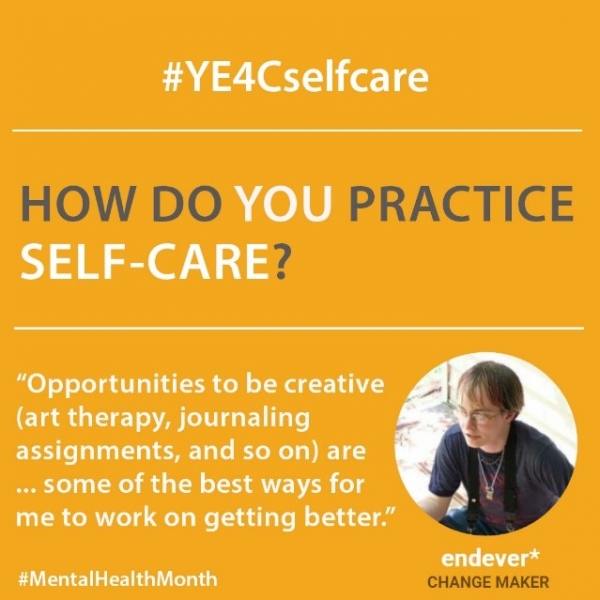Through Social Media, Youth Share Insights on Caring for Self and Community
As children and young people mature, they inevitably experience varying levels of stress and pressure related to school, social relationships, exploring identity, and life transitions.
While most young people are healthy, physically and emotionally, a national and international literature review found that an average of 17 percent of young people experience an emotional, mental, or behavioral disorder. Depression is on the rise among teens. According to the 2017 SAMHSA National Survey on Drug Use and Health, 13.3 percent of young people ages 12 to 17 experienced a major depressive episode, up from 12.8 percent in 2016. While treatment rates are also increasing, too many young people still don’t get the help they need: 57.4 percent of young adults with a serious mental illness received treatment in 2017, according to SAMHSA.

For all young people—whether they live with a serious mental health condition, trauma or the daily stresses of life—adolescence is an important time to begin to understand mental health and wellbeing and the impact it has on our ability to learn, grow and lead in our communities. It is also a key time to begin to develop lifelong practices that nurture well-being.
Just as our physical health comprises many different factors and components, mental health encompasses our emotional, psychological, and social well-being. Cultivating the skills, time and support to take proper care of oneself is an important component of emerging adulthood. Adults have a role to play in helping all young people develop these practices, and in reducing stigmas associated with mental health.
As part of May’s Mental Health Awareness Month, we held a month-long social media activation to encourage young people to share insights with peers about wellness and self-care. Using Twitter, Instagram and Facebook, Youth.gov and Youth Engaged for Change shared questions and ideas to start a dialogue about the tools and actions that young people find helpful in taking care of themselves and their communities.
Here is a sample of the insights and ideas shared during this activation, which offers a glimpse into how young people see self-care, and some specific ways that adults and peers can them understand and practice it.
Timeka
“To me, Self-care equates to relaxation and it can come in different forms. It’s the little things like a ten-minute walk, an hour at the gym, dieting interchangeably, a mud mask session, or even a venting session on the phone with my girls that helps me ground myself. In the hustle and bustle of work and school life, I tend to forget to take a moment of introspection to remind myself that I am amazing and deserving of a break.”
Ezra
“There are times every single day where I get so frustrated with everything that’s going on around me, and it’s impossible not to be overwhelmed by the negative influences I’m surrounded by. That is why I go to the gym and take out all my frustration on getting in shape and taking care of my body, as it allows me to realize that my life does matter, and with hard work and persistence I can accomplish anything I want to in life!!”
Frances
“I try to have one day a week where I do something fun even if it is something small like listening to music, watching movies, doing a face mask, and spending time with my friends and family. I learned that if I have a self-care day to look forward to, it helps me deal with the stress and anxiety of the week!”
Daisia
“As a full time college student, working on campus, and being a campus culture club leader, it is hard to find time for self-care. I forget I should take time to breathe. One of my friends once told me I should take ‘Daisy time’ for me (my nickname). I like to do homework assignments a week or two weeks in advance, so giving myself “Daisy time” would be pushing my assignments off for two to three days so I have time to myself to relax, watch my favorite shows or catch up on rest.”
Lauren
“In terms of my mental health, I have really struggled this year. Being more aggressive about protecting the time I need for self-cafe and making sure not to isolate myself have really helped me. I wish I would’ve learned those things sooner.”

Learn More
- For more resources from us on helping young people with mental health, explore our full section on Mental Health.
- For more from young people, visit our microsite for youth ages 16 to 24, Engage.Youth.org and in particular, our Youth Insights on Mental Health section.
